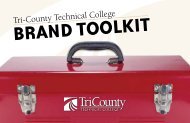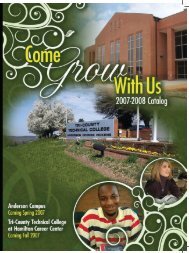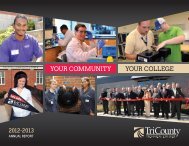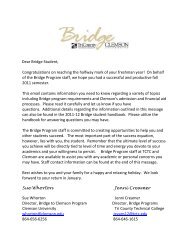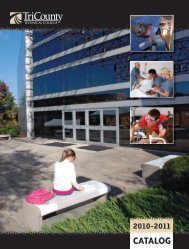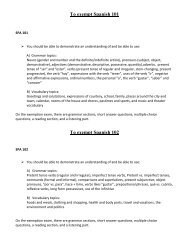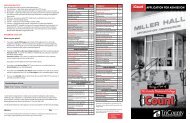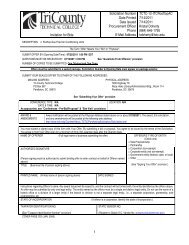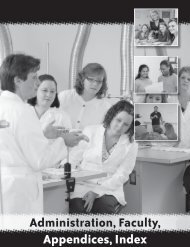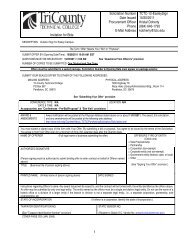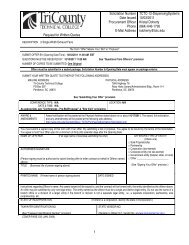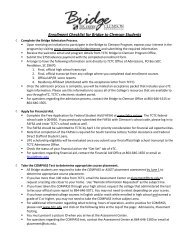TCTC Catalog - Tri-County Technical College
TCTC Catalog - Tri-County Technical College
TCTC Catalog - Tri-County Technical College
You also want an ePaper? Increase the reach of your titles
YUMPU automatically turns print PDFs into web optimized ePapers that Google loves.
ADMINISTRATION/<br />
FACULTY<br />
APPENDICES<br />
& INDEX<br />
Appendices<br />
POLICY<br />
APPENDIX 1<br />
ALCOHOL AND OTHER<br />
DRUG USE POLICY<br />
The South Carolina <strong>Technical</strong> <strong>College</strong> System prohibits the<br />
unlawful manufacture, distribution, dispensation, possession<br />
or use of narcotics, drugs, other controlled substances or alcohol<br />
at the workplace and in the educational setting. Unlawful<br />
for these purposes means in violation of federal/state/local regulations,<br />
policy, procedures, rules, as well as legal statutes.<br />
Workplace means either on agency premises or while conducting<br />
agency business away from the agency premises. Educational<br />
setting includes both institutional premises or in approved<br />
educational sites off campus.<br />
The South Carolina <strong>Technical</strong> <strong>College</strong> System recognizes that<br />
chemical dependency through use of controlled or uncontrolled<br />
substances, including alcohol, is a treatable illness. The agency<br />
supports and recommends employee and student rehabilitation<br />
and assistance programs and encourages employees and<br />
students to use such programs.<br />
It is the policy of <strong>Tri</strong>-<strong>County</strong> <strong>Technical</strong> <strong>College</strong> to provide a<br />
drug free, healthful, safe and secure work and educational environment.<br />
Employees and students are required and expected<br />
to report to their work, class, or student activities in appropriate<br />
mental and physical condition to meet the requirements<br />
and expectations of their respective roles.<br />
<strong>Tri</strong>-<strong>County</strong> <strong>Technical</strong> <strong>College</strong> will implement alcohol and<br />
other drug awareness programs for employees and students.<br />
STUDENT ALCOHOL AND<br />
OTHER DRUGS PROCEDURE<br />
<strong>Tri</strong>-<strong>County</strong> <strong>Technical</strong> <strong>College</strong> is committed to an ongoing<br />
student alcohol and other drug prevention program composed<br />
of both education and rehabilitation components as outlined<br />
below:<br />
1. Education programs for students which ensure that students<br />
are aware of the health risks and effects of alcohol.<br />
Counseling and Referral<br />
2. All aspects of counseling and referral will remain confidential<br />
unless the recipient gives written permission to<br />
do otherwise. This is in accordance with the Family Education<br />
Rights and Privacy Act of 1974.<br />
3. Compliance with the Drug Free Schools and Campus<br />
Act 34 CFR Part 86.<br />
The <strong>College</strong> will have an active, college-wide advisory committee<br />
on alcohol and other drug awareness issues. The goals<br />
of this committee will be to set forth guidelines for the student<br />
prevention program and to work with other individuals and<br />
agencies within the community to help make recommendations<br />
concerning specific implementation of the program. The<br />
committee will also gather feedback on the effectiveness of the<br />
program’s implementation.<br />
Faculty and staff will make every effort to address any<br />
problem(s) a student may have as quickly, thoroughly, and discreetly<br />
as possible, so that disposition of any problem will be<br />
timely and in due process. To accomplish this objective, the<br />
following procedures will be observed:<br />
1. In the case of possession, use, or distribution of alcohol<br />
or illegal drugs on campus, the student(s) will be referred<br />
to the Vice President for Student Affairs for disciplinary<br />
action in accordance with the Student Code<br />
for South Carolina <strong>Technical</strong> <strong>College</strong>s as outlined below.<br />
The General Provisions portion of the Student Code sets forth<br />
the rights and responsibilities of the individual student.<br />
Section I - Principles: “<strong>Technical</strong> <strong>College</strong> students are members<br />
of both the community at large and the academic community.<br />
As members of the academic community, students<br />
are subject to the obligations which accrue to them by virtue<br />
of this membership. As members of the larger community of<br />
which the college is a part, students are entitled to all rights<br />
and protection accorded them by the laws of that community.<br />
By the same token, students are also subject to all laws, the<br />
enforcement of which is the responsibility of duly constituted<br />
authorities. When students violate laws, they may incur penalties<br />
prescribed by legal authorities. In such instance, college<br />
discipline will be initiated only when the presence of the student<br />
on campus will disrupt the educational process of the<br />
college. However, when a studentís violation of the law also<br />
adversely affects the college’s pursuit of its recognized educational<br />
objectives, the college may enforce its own regulations.<br />
When students violate college regulations, they are subject to<br />
disciplinary action by the college whether or not their conduct<br />
violates the law. If a student’s behavior simultaneously violates<br />
both college regulations and the law, the college may take disciplinary<br />
action independent of that taken by legal authorities.”<br />
Section II - Internal Solutions to Problems: “The college will<br />
seek to solve problems in internal procedures of due process.<br />
When necessary, off-campus law enforcement and judicial<br />
authorities may be involved.” The Student Code describes<br />
“unlawful acts.”<br />
Section III, F-6: “Possession, use, or distribution on campus<br />
of any narcotics, dangerous, or unlawful drugs as defined by<br />
the laws of the United States or the State of South Carolina.”<br />
Section III, F-7: “Possession, use or distribution on campus<br />
of any beverage containing alcohol.”<br />
Section III, F-8: “Violation of institutional policies while on<br />
campus or off campus when participating in a college sponsored<br />
activity.”<br />
Section III, F-9: “Violation of South Carolina and/or federal<br />
laws while on campus or off campus when participating in a<br />
college sponsored activity.”<br />
Section III, F-10: “Engaging in any activity which disrupts<br />
the educational process of the college, or adversely interferes<br />
with other normal functions and services.”<br />
In all cases where there is reasonable evidence that a student<br />
has been involved in such activities, the student(s) will be required<br />
to meet with the campus alcohol and other drug<br />
127



